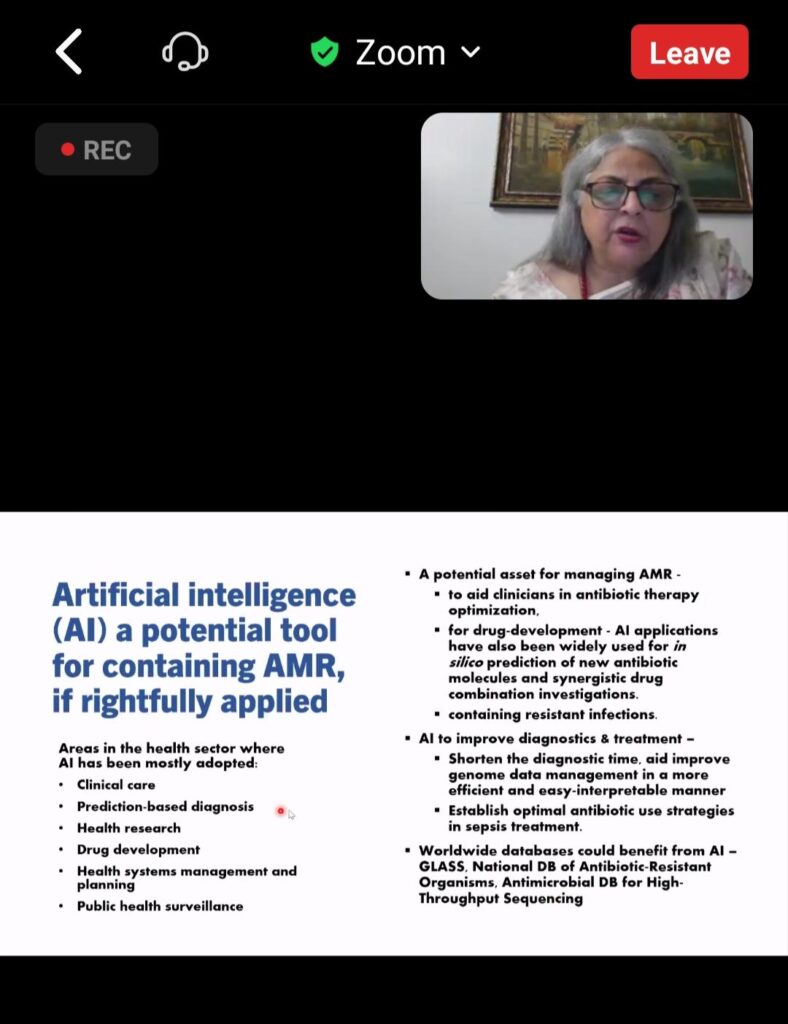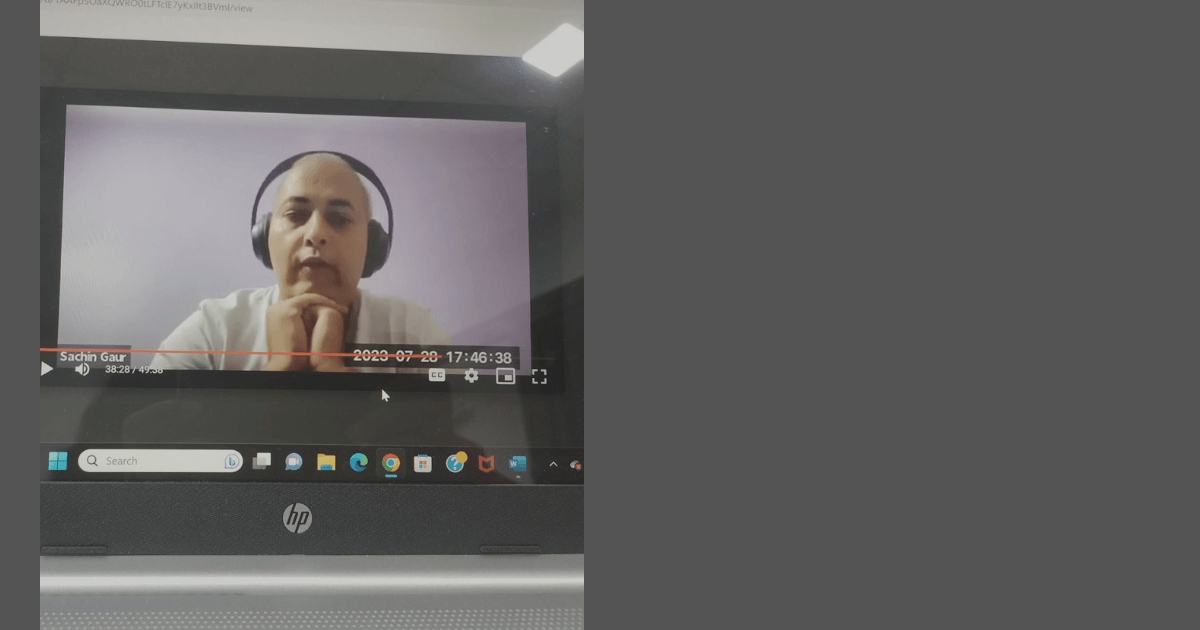The session began with Mr. Sachin Gaur, the Director of Operations at InnovatioCuris Foundation of Healthcare & Excellence, initiating the meeting. He introduced the IC Innovator CLUB and highlighted that the focal point of the meeting’s discussion would be “One HEALTH.” Mr. Gaur proceeded to introduce the guest speaker, Dr. Sangeeta Sharma, who holds the position of a professor in the department of neuropsychopharmacology at the Institute of Human Behaviour & Allied Sciences. Additionally, he mentioned her role as the president at DSPRUD and her active involvement with various organizations. He also made reference to a book authored by Dr. Sharma in the field of therapeutics. Following this introduction, Dr. Sharma was invited to take the floor and commence her presentation on the subject of ‘Antimicrobial Medication Safety & Quality in Healthcare’.
After expressing gratitude to Mr. Sachin, Dr. V K Singh, Mr. Sanjay, and the team, Dr. Sangeeta embarked on the continuation of the discussion. She emphasized the contemporary significance of the topic and swiftly provided a concise overview of the fundamental aspects of ‘one health’ and antimicrobial resistance. Dr. Sangeeta delved into the historical context, touching upon the foundational phase of the antibiotic era and its subsequent prosperous period. However, she noted a shift in momentum during the 1980s and 1990s when the pace of new antimicrobial discoveries began to decelerate, marking an era characterized by the rise and fall of antibiotics.
Highlighting the global scope of the issue, she underlined that antimicrobial resistance (AMR) has evolved into a worldwide health concern, further exacerbated by the context of the COVID-19 pandemic. Dr. Sangeeta pinpointed Asia and Africa as the regions most severely impacted by AMR, where antibiotic effectiveness has diminished significantly, posing a tangible threat to development. A concerning prediction was shared, projecting a staggering annual death toll of 10 million by 2050, accompanied by a substantial global economic burden resulting from inaction.
Moving forward, Dr. Sangeeta delved into the catalysts driving the escalation of this problem. She elucidated the reasons for the influence of AMR on sustainable development goals. One key factor lies in the dual usage of antibiotics for both human and non-human purposes, with veterinary applications equally crucial for preserving animal health. This holistic approach is pivotal for safeguarding human well-being. The discourse turned to the existing challenge of irrational antibiotic usage in human healthcare, creating a complex dilemma regarding which sectors contribute disproportionately to antibiotic consumption.
Furthermore, Dr. Sangeeta highlighted the interconnectedness of bacterial propagation across borders and supply chains, facilitated by extensive air networks. She transitioned to emphasize that the contemporary surge in antimicrobial usage has become the principal driver behind the development and dissemination of AMR. The misuse of antibiotics by medical practitioners, patients, pharmacists, and also their application in animal husbandry and agriculture, emerged as significant contributors to this dilemma.
Today these antibiotics are used as shortcut for poor sanitization techniques and shortage for poor patient education and that’s how overuse is done, nearly 50 % patient admit in IPD get antibiotics, now match it with morbidity, it is happening because these antibiotics in injection used for nonbacterial trivial infection like common cold & diarrhoea, Copious prescription is major component for resistant problems. Consequences of AMR, are where the post antibiotic era is imminent & threatens to reverse medical progress, like simple infections, higher chances of treatment failure and deaths, longer stay & uncontrollable epidemics. Now the horror & the importance coming from the running out of antibiotics. Losing antibiotics will be disastrous for humanity as many lives have been saved, even careful use of antibiotics can lead to emergence of AMR. It raises a number of ethical problems like issues regarding overuse and lack of access to antibiotics, intergenerational problems like; they will be able to see MDR only not antibiotics, paradoxes influencing AMR, like brand & positioning.
Dr. Sangeeta further summarised the AMR as Multisectoral, Multidimensional & Multifaceted Problem, as it is biological containment, technical and economic issue as we use it for cost economy of healthcare and regulations are need to control availability and implementation, educational issue as most of the people are not aware of this & behavioural issues. ONE HEALTH is an complex issue which includes human, environment & animal food, legal enforcements of laws to restraint the use and control infection and how can we improve antibiotic prescribing through common areas of improvement like wrong choice, overprescribing and many more, effective stewardship is much more complex now and also the diagnostic errors but the problem is pathogens are now originating from plants and animals which are coming back to us through different modes, as there is a widespread use of antimicrobials in livestock production, agriculture & not only for therapeutic purposes.
She further added India has one-fourth incidence of MDR TB & also India is one of the largest producer and consumer of antibiotics for human use and has a high level of mortality due to drug resistant pathogens so strengthening and engagement with sector specific regulatory organizations and state governments is required. Here we come with approach ONE HEALTH where we take care of human health, animal health, plant health, environment all together, in different sectors, it is nothing but working together and taking actions and is all about 5 Cs’ Coordination, Collaboration, Cooperation, Communication & Commitment .National action plan was made by WHO, it identify critically ill antibiotics in different sectors which we need to save and India also adopted this frame and we look into regulation and innovative projects which enhance financing & for that leadership is very important. NAP-AMR strategies are implemented in states of India which are; awareness and understanding of AMR, knowledge & awareness, infection prevention & control, optimistic use, innovations, and leadership and focusing on one health approach through mass campaigns for school children, strengthening laboratory capacities, surveillance & AI based systems are also important. She concludes over the years research is not happening in this area so people are losing expertise in this area, if we need to handle this problem, we need an end to end approach for newer & older products.
Mr. Sachin expressed his gratitude to Dr. Sangeeta for imparting her valuable knowledge and she was further engaged in a Q&A session with questions. During this interaction, he presented a query to Dr. Sangeeta regarding the concept of AMR being a time bomb with a lingering impact. He inquired about her overall viewpoint on this matter. In response, Dr. Sangeeta conveyed that we are presently in the phase beyond the effectiveness of antibiotics, and she expressed a lack of optimism unless prompt actions are taken and various sectors undergo enhancement. She emphasized that addressing this issue necessitates substantial financial resources and a considerable investment of time.
Mr. Sachin continued with Q & A Round; He asked about the Case of Calcutta where the first patient in the world got plant fungus, he queried; Do u foresee more such zoonotic cases, new viruses which jump into species like covid in future? Dr. Sangeeta responded, we are destroying our environment like deforestation and it was distinct priorly but now we are more in exposure to animal so the chances of increasing in the cases will be more in future.
Further he questioned about in general drug discovery side methods, like E.coli pathway blockage method by AI molecule approach; to which she replied, our 5th priority is research we need to find alternatives from the research & for this we need to work on resistance mechanism as well, it is the easiest part to work on and also preserve the present one and AI can predict chance of appropriate antibiotics and we should use these technologies here to full action. We can use system surveillance and AI, they have a lot of potential.
And advice for young generation, it is a part of curriculum, antibiotics studies on microbiology integrated curriculum is provided some changes, & in Post graduate teaching also, earlier pharmacology was taught now integrated and competency curriculum changes are there , then National Medical Commissions brought advisory that all medical colleges should have antimicrobial stewardship program and actions, so now major focus added to education and induction training and job training and most important to know about when not to prescribe this if focus goes on that perhaps things will change.
At last, Mr. Sachin thanks for sharing knowledge and heartfelt gratitude towards her and He also made an important announcement about the conference that will be held physically on 13th & 14th of October in partnership with IIIT Delhi, the topic of the conference is “CLINICAL VALIDATION OF EMERGING TECHNOLOGIES”. He again thanked all the participants for joining & this concluded the meeting.


